Compare
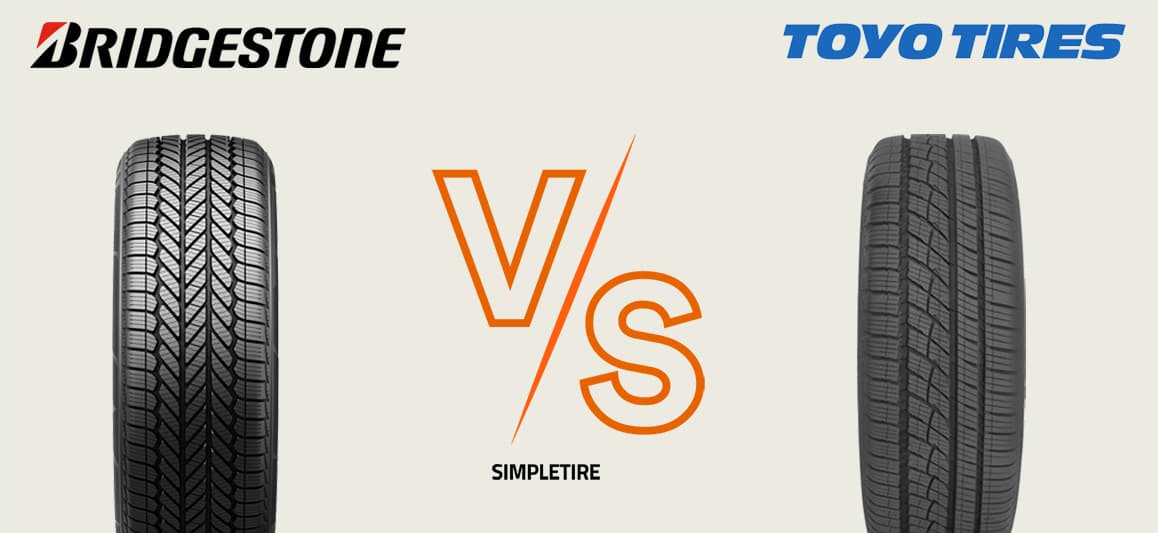
Several tire manufacturers tend to use all-weather tires and all-season tires interchangeably, but that’s not the real picture. Though both are fully capable of providing year-round traction and performance, all-weather tires have the additional ability to perform in moderate to heavy snow. In comparison, the sipes and grooves on all-season tires are suitable only for light snow and ice. Anyone who’s ever attempted to safely navigate through 4-5 inches of snow and ice on the roads will be aware of the limitations of all-season tires. As a result, they would have ended up craving better braking, traction, and control. All-weather tires occupy the sweet spot between all-season and winter tires, but without the headache of having to maintain/store winter tires at temperatures above 40-45 degrees Fahrenheit.
Have you heard about Simple Score? SimpleScore is our method of determining whether a tire fits your needs based on its capabilities and performance according to traction, handling, longevity, and average score. One of the best tires in the all-weather category that achieves nearly perfect scores in all the tested parameters is the Bridgestone Weatherpeak. The Weatherpeak is the older tire here, being launched in June 2022 as opposed to the Toyo Celsius II in February 2023. Though both tires receive Three Peak Mountain Snowflake certification, the Bridgestone offers the higher limited manufacturer tread life warranty. A minor difference can be seen in the tread depths of the two tires.
We will be completing a Weatherpeak vs Celsius II tires comparison here as per the following SimpleScores:
Bridgestone Weatherpeak
- Traction: 9.8
- Handling: 9.5
- Longevity: 9.8
- Overall average SimpleScore: 9.7
Toyo Celsius II
- Traction: 8.8
- Handling: 8.8
- Longevity: 9.0
- Overall average SimpleScore: 8.8
Although the Bridgestone may appear at a much higher pedestal than the Toyo, both of them must be addressed as per their sets of strengths and weaknesses. These tires are priced differently (we’ll touch upon the prices later), but there’s much more to discuss here than just the SimpleScores.
Bridgestone Weatherpeak tires
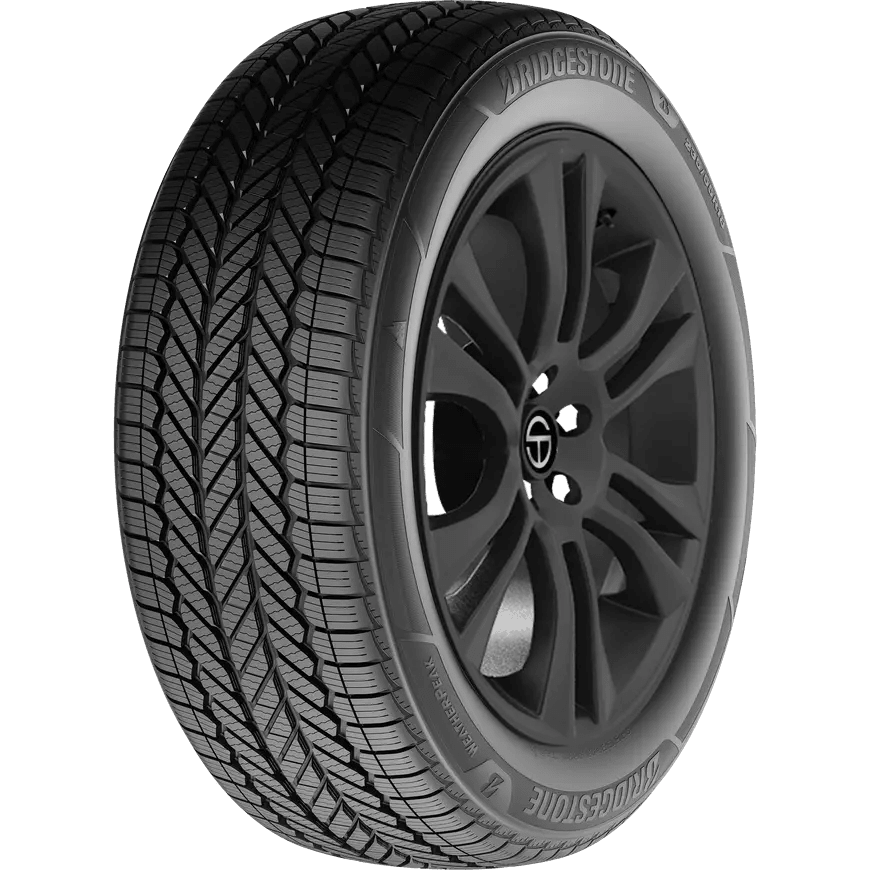
Even though originally Japanese, Bridgestone has managed to capture a substantial share of the US market since 1967 and is among the top manufacturers today. As a result, it enjoys a great deal of customer trust, buoyed further by its portfolio of innovative products. Bridgestone Weatherpeak offers buyers numerous useful features, including open shoulder slots for wet grip, evolving sipes, a symmetric tread pattern, and a special groove channel.
As an all-weather tire, the Bridgestone Weatherpeak is covered by a substantial limited manufacturer tread life warranty, the details of which will be spelled out later. Based on its reputation, technologies, and more, the Weatherpeak receives an outstanding average SimpleScore of 9.7. It is clear that this score displays no scope for any further improvement on Bridgestone’s behalf, showing that the tire already showcases tremendous capabilities in this segment.
Toyo Celsius II tires
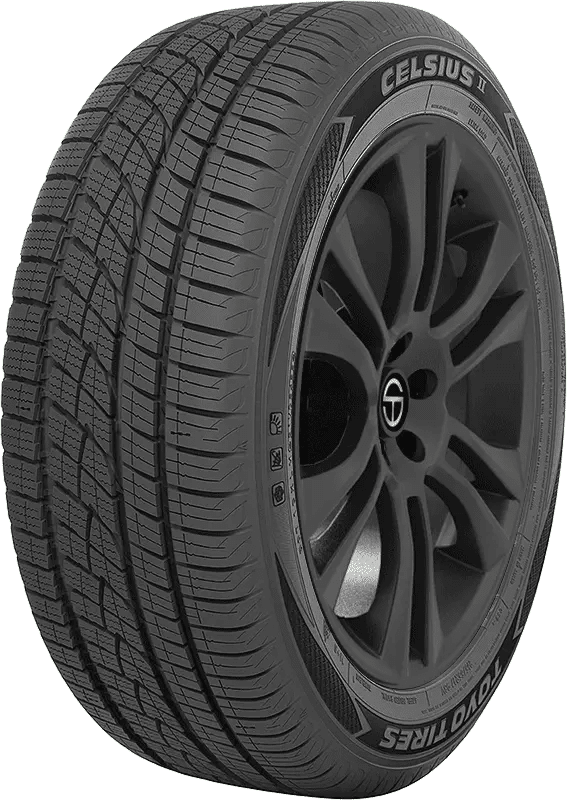
You’re currently amid a comparison between two Japanese samurais of the tire world. As yet another Japanese manufacturer, Toyo Tires has been recognized for its superior quality, service, performance, innovative engineering, and top design. Toyo develops its high-quality tires at a state-of-the-art manufacturing facility in Bartow, GA, and its American division is called Toyo Tire U.S.A.
The Toyo Celsius II offers buyers a potent mix of tread life, comfort, and year-round traction. Both Toyo and Bridgestone provide Three Peak Mountain Snowflake-certified tires in this segment. Snow claws and the unique tread compound are useful for improved snow traction and performance, and the latter plays its part in longevity as well. Expect its limited manufacturer tread life warranty to be lower than that of the Bridgestone. With a flexible platform that fits the majority of on-road situations, this comfortable tire easily absorbs large bumps and registers an average SimpleScore of 8.8.
Bridgestone Weatherpeak vs Toyo Celsius II tires on traction
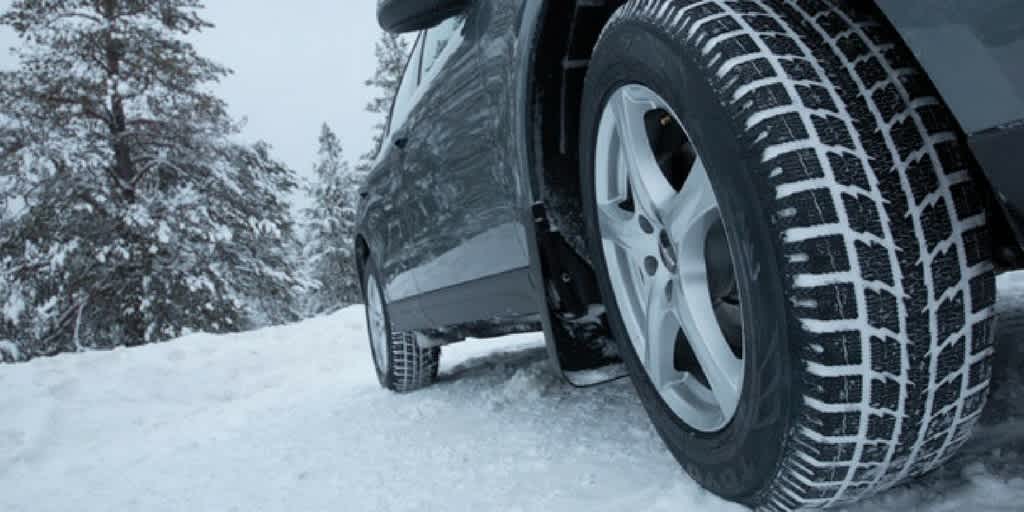
So how does the traction of the Bridgestone stand against that of the Toyo? We’ll come to the scores later, but there are full-depth 3D sipes for higher grip on snowy and icy roads and open shoulder slots on the Bridgestone for greater wet traction. Expect evolving sipes to bite into the roads for further boosting grip. Both tires sport symmetric tread patterns that ensure good road-holding capabilities, but the Bridgestone registers a mammoth 9.8 as its average traction score.
Even the Toyo tire showcases a competent suite of attributes for a steady, confident grip in winter conditions. In contrast to the above tire, the Toyo Celsius II has a complex polymer mix for good grip in slick winter conditions. Additionally, it also features an asymmetric tread pattern and snow claws for further boosting traction. A unique silica-based compound is responsible for flexibility in cold climates, leading to high grip. High sipe density and zigzag-shaped tread blocks decrease the chances of slipping in cold conditions and assure drivers of consistent grip. Based on the above, the Celsius II receives an average traction score of 8.8.
ADVANTAGE: Bridgestone Weatherpeak
Bridgestone Weatherpeak vs Toyo Celsius II tires on handling
Despite Toyo having substantial experience in the motorsports field, it still is no match for the levels of performance achieved by the Bridgestone tire. Overall, the influence of motorsports means a greater testing ground for tire designs, and Toyo does produce a few DOT competition tires. Evolving sipes on the Bridgestone play their part in boosting snow performance and the special groove channel takes wet handling to a very high level while draining water from the treads.
On the other hand, the asymmetrical tread pattern on the Toyo enhances acceleration, stability, and cornering performance. Zigzag-shaped tread blocks and dense sipes prevent vehicles from slipping and sliding dangerously. Once again, much like the Bridgestone, the rubber compound plays a part in improving snow performance.
We found the Bridgestone tire worthy of a tremendous handling score of 9.5 and the Toyo tire suitable for an 8.8.
ADVANTAGE: Bridgestone Weatherpeak
Bridgestone Weatherpeak vs Toyo Celsius II tires on longevity
Both tires feature sipes for better traction. Sipes are meat for ensuring even wear, and while the Bridgestone receives full-depth sipes and evolving sipes for snowy and wet roads, the Toyo gets dense sipes. The Toyo tire features an asymmetric tread pattern that leads to lesser uneven wear than the symmetrical pattern on the Bridgestone. However, the Bridgestone is ahead in terms of limited manufacturer tread life warranty as it gets 70,000 miles, as against 60,000 miles for the Toyo.
Both tires have comprehensive programs that include more than just the tread life warranties. While Bridgestone has a 90-day Buy and Try Guarantee, Toyo’s program includes a 500-mile or 45-day trial and a mileage warranty (terms and conditions apply). At the end of the day, the Bridgestone registers a 9.8 as a longevity score that is far ahead of the 9.0 for the Toyo.
ADVANTAGE: Bridgestone Weatherpeak
When to use each
Both the Bridgestone Weatherpeak and Toyo Celsius II are excellent options for all-weather tires that offer buyers year-round reliable, steady grip, a healthy limited manufacturer's tread life warranty that also includes extra features and the coveted Three Peak Mountain Snowflake certification for effective traction in moderate to severe winter weather. There is no need to worry about the storage and maintenance of winter tires when you buy them.
However, if you live in areas that experience extremely low temperatures for more than 6 months a year, you would be compelled to own a pair of winter tires. The only grey area here is that on warmer days, the tread compound of a winter tire quickly wears down, which is why tire manufacturers advise switching back to all-season tires when temperatures are above 40 to 45 degrees Fahrenheit. Owning an all-weather tire would eliminate the need to think about changing tires during the year. Overall, Bridgestone Weatherpeak seems to ace the scores more often than the Toyo Celsius II.
Which one should you choose?
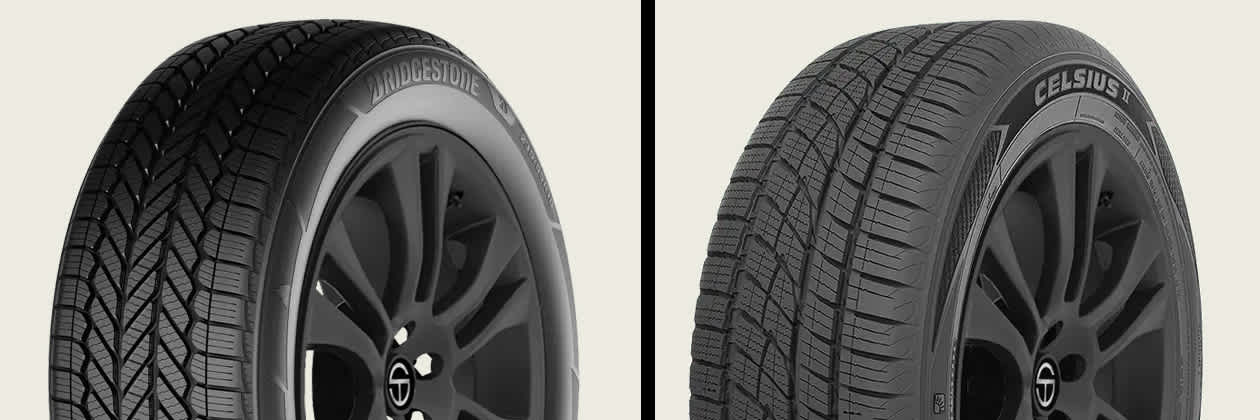
It isn’t particularly difficult to compare the two tires once you acknowledge the fact that the Weatherpeak is ahead on all the parameters above. However, the brilliance of Bridgestone doesn’t mean that the Toyo tire here is not a competent product. You may enjoy the acceleration and the stability from the Toyo tire more than that of the Bridgestone tire. To bring the comparison further into perspective, let’s have a look at the starting prices of the two tires.
While the Bridgestone Weatherpeak is priced at roughly $168 ($672 for 4), the Toyo Celsius II is available from $103 ($412 for 4). Clearly, there’s a massive difference of nearly $200 in their prices for 4 tires, which means that it holds the potential for reversing your decision.
Given below are the reasons to buy the Bridgestone Weatherpeak:
- Better traction
- Better handling
- Higher limited manufacturer tread life warranty
- Greater longevity
Here’s why you may want to buy the Toyo Celsius II:
- You want the less expensive tire
- You want better cornering performance and acceleration
- An asymmetrical tread pattern is beneficial for both traction and performance
- More features in the comprehensive warranty program
Still not sure which tire to buy? Fortunately, SimpleTire is here to help as our helpful agents will be more than happy to assist you in selecting the right tire for your ride and budget.
Ready to find the perfect tires?
Search By